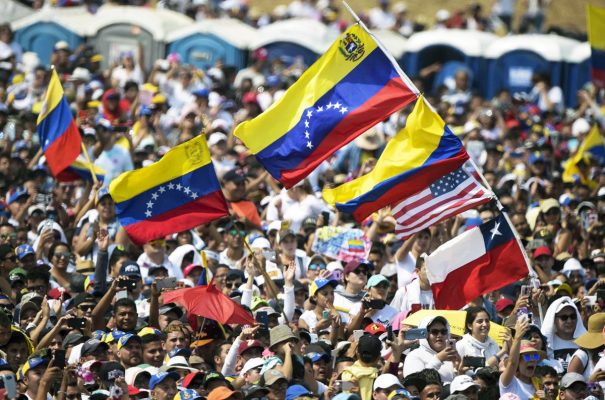Venezuela braced for new demonstrations Tuesday, after four people died and dozens were injured when the authorities broke up protests against President Nicolas Maduro’s claim of victory in the country’s hotly disputed weekend election.
Security forces had fired tear gas and rubber bullets Monday at angry protesters who claimed the election was stolen and flooded the streets chanting “Freedom, freedom!” and “This government is going to fall!”
Some ripped down and burned Maduro campaign posters while at least two statues of Hugo Chavez — the late authoritarian socialist who led Venezuela for more than a decade and handpicked Maduro as his successor — were knocked down by protesters.
Attorney General Tarek William Saab said Tuesday 749 “criminals” had been arrested during the protests and faced charges of resisting authority or, “in the most serious cases, terrorism.”
The opposition fiercely contests the outcome of Sunday’s election which authorities say was won by Maduro with 51.2 percent of votes cast compared to 44.2 percent for Edmundo Gonzalez Urrutia.
Opposition leader Maria Corina Machado, who was replaced by Urrutia on the ballot after she was barred from running by Maduro-aligned courts, said voting records showed Urrutia had a “mathematically irreversible” lead.
The opposition count gives Gonzalez Urrutia 6.27 million votes to Maduro’s 2.75 million.
The Organization of American States, a regional body, charged Tuesday there was “exceptional manipulation” of the election results that handed Maduro the win.
The protests that erupted on Monday left 44 injured, most of them with bullet wounds, according to the National Hospital Survey, a network that monitors crises in the country’s hospitals.
Two of the dead were in the state of Aragua and one in Caracas, the network said. The NGO Foro Penal meanwhile reported one more dead in the northwestern state of Yaracuy.
“Unfortunately, in the last few hours we have reports of people killed, dozens injured and detained,” Gonzalez Urrutia wrote on X.
He urged security forces to “stop the repression of peaceful demonstrations.”
• ’Absolute loyalty’ –
The Defense Ministry for its part reported 23 wounded military personnel.
Defense Minister Vladimir Padrino assured that Maduro had the “absolute loyalty and unconditional support” of the armed forces.
Machado called for families to turn out Tuesday for “popular assemblies” nationwide to show support for a peaceful transition of power.
Maduro’s campaign manager Jorge Rodriguez, also called on X for “large marches starting this Tuesday to celebrate the victory.”
Amid growing fears of violence, a leading figure in the opposition coalition, Freddy Superlano, was “kidnapped” by black-clad officials, his Voluntad Popular said on X.
Venezuela’s elections were held amid widespread fears of fraud by the government and a campaign tainted by accusations of political intimidation.
The United Nations, United States, European Union and several Latin American countries called for a “transparent” process after the vote, while allies including China, Russia and Cuba congratulated Maduro.
Nine Latin American countries called in a joint statement for a “complete review of the results with the presence of independent electoral observers.” Chile’s president said the outcome was “hard to believe.”
Amid the tensions, Peru recalled its ambassador and Panama said it was suspending relations with Venezuela. Caracas meanwhile said it was withdrawing diplomatic staff from Argentina, Chile, Costa Rica, Panama, Peru, the Dominican Republic and Uruguay.
• ’Bloodbath’ warning –
Independent polls had predicted Maduro would lose Sunday’s vote.
He has been at the helm of the once-wealthy oil-rich country since 2013. Amid US sanctions and economic mismanagement, the past decade has seen GDP drop by 80 percent, pushing more than seven million of Venezuela’s 30 million citizens to emigrate.
Maduro is accused of locking up critics and harassing the opposition in a climate of rising authoritarianism.
In the run-up to the election, he warned of a “bloodbath” if he lost.
Sunday’s election was the product of a deal reached last year between the government and opposition.
That agreement led the United States to temporarily ease sanctions imposed after Maduro’s 2018 reelection, rejected as a sham by dozens of Latin American and other countries.
Sanctions were snapped back after Maduro reneged on agreed conditions.
Venezuela boasts the world’s largest oil reserves but production capacity has been severely diminished in recent years.
AFP



